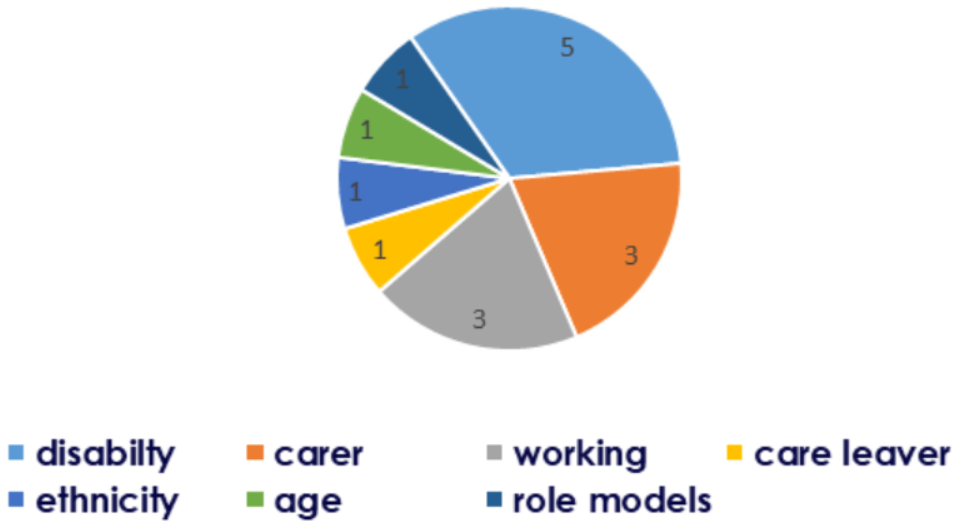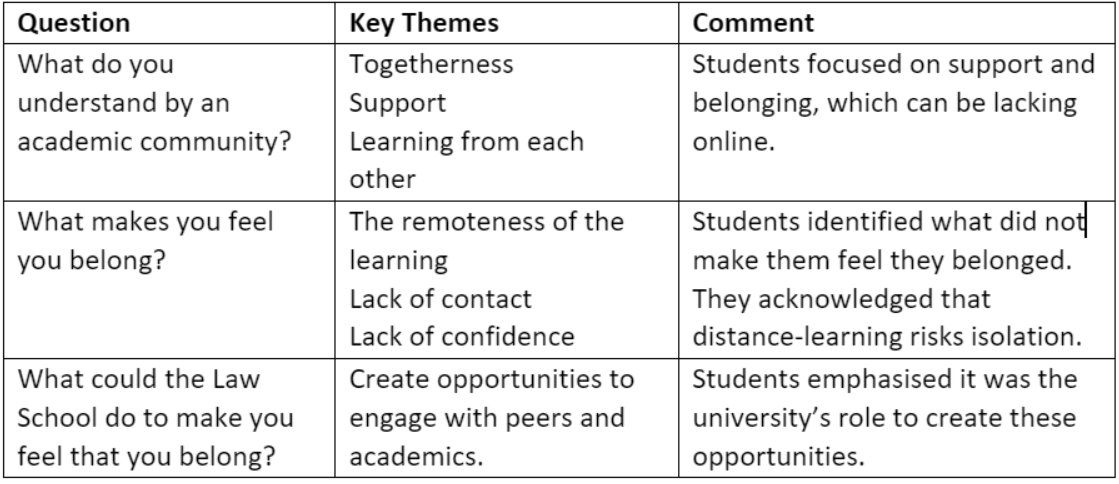You are here
Enhancing distance learning student experience by creating a feeling of belonging

Carol Edwards and Liz Hardie share their approach to combating isolation and fostering a sense of belonging in the distance-learning environment through the introduction of the “Belonging Project” at the Open University Law School.
The context
The Open University Law School (OULS) is a leading provider of legal distance-education. Our teaching pedagogy is based on a blended approach using asynchronous and synchronous methods. Students have access to interactive learning materials, online live tutorials, recorded tutorials and a tutor who supports their learning and provides developmental feedback. Each student is allocated to a tutor group of approximately 20 students and can interact with other members of the group via a forum.
The problem
Distance-education provides a wealth of advantages for students; not least the flexibility to study at a time and place that suits. It also has a number of drawbacks, including feelings of isolation and a lack of a sense of belonging, both of which can impact on retention. Students in the face-to-face environment have the opportunity to form support networks through informal moments, perhaps at a coffee break. These chance meetings provide students with the opportunity to form relationships which will foster study communities and a sense of belonging. This does not happen online and can result in students feeling they are studying in isolation which can impact on the student’s wellbeing (Heaton-Shrestha et al., 2009). As law students have some of the highest wellbeing issues (Jones and Strevens 2022) we felt this was something we needed to try and address.
What we did
We formed the “Belonging Project” to encourage students to develop a sense of belonging and reduce isolation. We took a programme level approach which allows students from any module and level to interact with their peers and academics in an informal setting. The project is now in its third year and has developed as follows:
Year One
- Online monthly guest lectures where academic staff share their research with the students in a presentation followed by a question-and-answer session.
- Monthly online student-led coffee events where volunteer students host a drop-in coffee event for other students. Student-hosts identified a theme based on their lived experiences, for example studying with a disability or studying while caring. A tutor supported the students in their preparation and was available by email during the event should the student-host have any issues.
- A pilot peer-mentoring programme using WhatsApp for students on the introductory module within the degree. Mentors were recruited from students who had successfully completed the module.
Year Two
- The online guest lectures and student-led coffee events continued.
- The Law School Blog started, open to OULS students, staff and alumni. An editor manages the day-to-day running of the blog.
- Online peer-mentoring scheme using WhatsApp for students on the introductory law module.
Year Three
- The online guest lectures, student-led coffee events and blog have continued.
- Online academic coffee events have been introduced for students to meet both academics and peers who have similar lived experience, for example first in family to go to university or dyslexia. The involvement of the academics provides role models for the students.
- A Law School EDI competition, where students were invited to produce a poster, podcast, leaflet or video answering the question “What can the Law School do to make your legal studies more relevant to your life experiences?” The finalists gave a short online presentation to a panel of judges including the Faculty Dean and Head of Law School: Law School students and staff attended the event.
Evaluation
Our evaluation has included statistics analysis, a survey to all students and focus groups. Our key findings are listed below.
Engagement
Student engagement has been evaluated for the first two years. As at 16-08-23 our data showed:
- All the guest lectures are recorded and have been viewed 3,926 times, averaging 178 viewings per lecture.
- 29 blogs were written by staff, 21 by students.
- The blog had 5,193 views, averaging 371 views per month. Viewer numbers varied between 88 and 1,024 per month.
The Law School Competition had 15 submissions and 12 were invited to the final. The chart below identifies what areas were addressed by the finalists.
Student Experience
A survey explored law students’ understanding of belonging to an academic community. The low return rate requires caution in interpreting the data, but the key findings were:
Student Attainment
The peer-mentoring project had a positive impact on student retention and attainment, as detailed below.
The impact of the other events on attainment will be evaluated in summer 2024.
Where next?
We are seeking funding to run another competition in December 2024, focused on more inclusive ways to develop employability skills. We are arranging the next programme of online events for 24-25, and planning a larger-scale peer-mentoring project for new law students.
Our data suggests students engage with the project and that it improves student outcomes. Belonging is a difficult term to define and it is unclear from our data whether the project directly improves student belonging. However, it is clear that students welcome the opportunity to meet outside of the formal teaching space and all institutions should be thinking how they may facilitate this.
Carol Edwards is a Senior Lecturer and Assistant Head of Student Experience (Retention and Outcomes), and Liz Hardie is a Senior Lecturer-in-Law, both working at the Open university. They have published on their research to tackle isolation and create a sense of belonging for students in the distance-learning environment.
References
Edwards, C. and Hardie, L. (2024) ‘Fostering a sense of belonging through online qualification events’, Distance Education, pp. 1–19.
Edwards, C., Hardie, E. & Gregory, L. (2021) ‘Setting up a Pilot Peer Mentoring Programme in the Online Environment’, Journal of Rights and Justice vol 2 p.3
Heaton-Shrestha C, May S and Burke L, ‘Student retention in higher education: what role for virtual learning environments?’ (2009) 33(1) Journal of Further and Higher Education 83.
Jones, E. & Strevens, C. (2022). Legal education for wellbeing: design, delivery and evaluation. The Law Teacher, 56:1, 1-4.
This blog was first published by Advance HE on 22nd July 2024.

Blog posts
- Rethinking Tuition: Reflections from the Staff Tutor / Student Experience Manager (SEM) Symposium, 4-5 December 2024 6th June 2025
- ‘Hitting the keyboard’ : Exploring student feelings and approaches to developing legal research skills 9th May 2025
- From Feedback to Action: The Student Voice Festival in Law Education 15th April 2025




